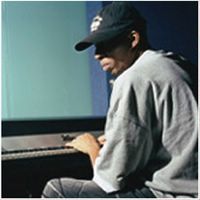just a little sample

nice little photo op
Although Wayne had waxed on the genius of Shocklee, many of us will be waxing on Wayne’s genius. I have also been enraptured by the articulation and breadth of Hank Shocklee but can only stumble through a summary of what I heard. But now, because Wayne has led us to the recordings of the Clinton / Shocklee interview and the panel that followed (scroll down to September 12th for the 4:30 and 5 o’clock audio and video) you can hear for yourself.
A few things to note that may make more sense after you’ve heard it all:
- All respect to moderator Rick Karr but heads should get a laugh at some of the pronunciations… Jeru the DamaJAH, Eric B and RakEEM, DELLA Soul.
- Karr also lets loose a snicker at Shocklee’s mention of Phil Collins’ drum sounds. Phil’s drum sounds are no joke in hip-hop.
- Karr looks for a connection to 'sampling as parody and critique' by asking Shocklee what his intentions were when sampling Anthrax for PE. Shocklee cut the query short... "I NEVER sampled Anthrax on a Public Enemy record."
- The copyright lawyer is not very familiar with Jimi Hendrix’ music and not familiar AT ALL with Public Enemy.
- ‘Statutory licensing’ could implement rules for sampling (similar to those that handle song covers) that could balance the expense and profit for all parties involved in sample based music. Sounds reasonable to me.
- One of the hypothetical situations brought up on the panel, that sample costs would have prohibited the creation of albums like Public Enemy’s ‘…Nation of Millions…’, can be a bit too sentimental for my taste. I wouldn’t want to romanticize the economic conditions that surely contributed to the creation of hip-hop (then and now) but I’m sure that total freedom and access to musical instruments, proper performance venues and afterschool programs would have more than likely changed the creative production of the hip-hop generation. The tension between art and the costs associated with it’s production and distribution seem to lead as much to creative thinking as to stifled opportunity. Obviously this should not be read as an argument for the constraints of poverty as creative impetus… but as an admiration of the art arising IN SPITE OF limited resources.
- Hank Shocklee touches on the idea that the notes and sounds from traditional musical instruments can be seen as ‘samples of the instrument creators.’ If you look at his compositions as ‘dependent’ on samples without appreciating what he does with the elements he has chosen to work with, the concept of a guitar note being a Fender sample will make no sense to you.
- Shocklee slows Clinton down after their interview for ‘a nice little photo op’ still understanding ‘the media’ as one of his instruments.


<< Home